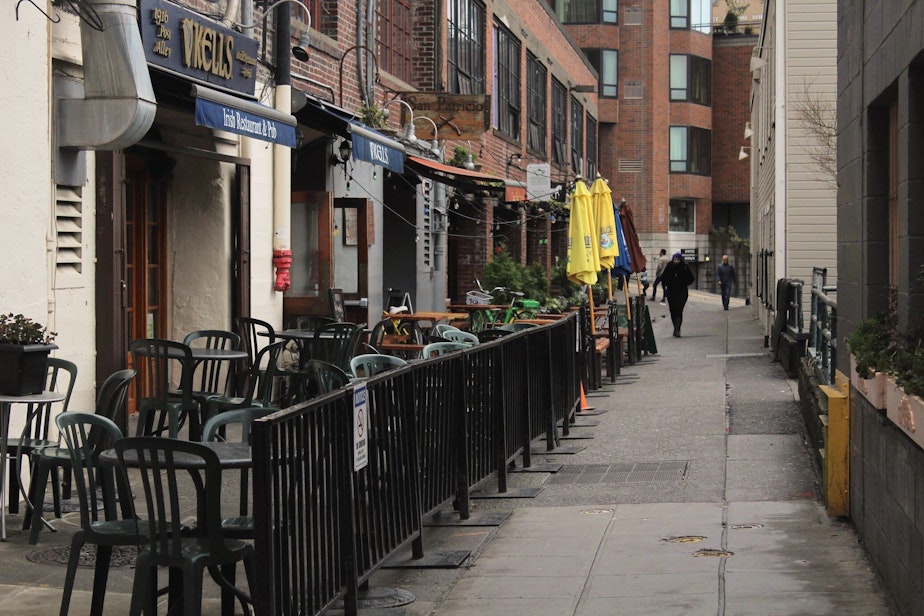'We don't know what restaurants are going to look like yet.' Seattle restaurant workers ponder post-pandemic future

Restaurants are gearing up for Phase 2 of Gov. Jay Inslee’s gradual state reopening plan.
For restaurant workers, reopening still presents a lot of uncertainty. There’s a sense that restaurants, bars, and places of gathering won’t be the same.
March 11 was Trina Ewing’s last day at the Grand Sheraton Hotel, where she was a bartender. She remembers feeling relieved when the state’s stay-at-home order was announced.
“I was a little bit worried going into work,” she recalled. “Working at a hotel, with people flying in from other places … it seems like a dangerous kind of situation.”
Ewing said she's hoping the shutdown will help us get over the pandemic quicker. During this downtime, she’s been gardening, tending to the flower beds outside her apartment.
She’s also trying to get the younger kids ready for school and making sure the older one is keeping up. Ewing is looking ahead and wonders what the future holds for her when stay-at-home restrictions are lifted.
“I’m worried about how we’re going to recover from this, economy-wise, and how many people might permanently lose their jobs … worrying that people are going to fall behind on bills.”
Sponsored
Restaurants have been one of the hardest hit industries during the pandemic. The National Restaurant Association estimates those workers account for 10% of employment in Washington state.
But even before the shutdown, Seattle restaurants had been facing pressures.
Many believe it was a matter of time before the restaurant bubble burst: profit margins are traditionally thin, even when times are good; couple that with paying employees livable wages and rising rent. And those delivery apps? Customers love them for the convenience. But at a big cost to food businesses.
“We don’t know what restaurants are going to look like yet and so I’m also not sure the future is going to look like as a chef,” said Michelle Mallett, a former cook at Tom Douglas Restaurants.
She had been working in the company’s catering end for the past decade until the restaurants were shuttered in March. For Mallett, it was a blow -- cooking has been a big part of her identity.
Sponsored
“It’s been rough because I’ve never been unemployed and a lot of my personal worth was tied to my job, in my mind,” she said.
During this downtime, Mallett has been contemplating a lot about the industry. She notes that many places have already been trending away from sit-downs, given the popularity of food delivery apps.
“It’s cheaper in many ways to have your food delivered and I think a lot Seattleites kind of liked that. Also, just because it’s more impersonal and you don’t have to interact with people as much.”
The pandemic has fully exposed all of these cracks, and it’s hard to imagine what the restaurant scene will look like post-coronavirus. A recent survey by the James Beard Foundation showed that four out of five independent restaurants don’t think they’ll survive the financial crisis.
Mallett is hopeful that the crisis will give people a better appreciation for what restaurants provide.
Sponsored
“Restaurant culture is about making people happy,” she said. “Whatever happens next, I think people are starting to realize what businesses are taking care of them, or specifically what chefs are doing for their employees. I think that’s going to come out as a big factor in consumer loyalty.”
Mallett wonders what’s next for her -- whether she’ll be able to have the same kind of job that she loves with the same pay and benefits, or whether she’ll have to start over again. Either way, when restaurants do reopen, social distancing will likely continue.
“That,” said Mallet, “is not a model that is conducive to a good sit-down restaurant.”
Mallett has been receiving unemployment benefits, and has also received a federal stimulus check. While she’s grateful for those, she misses her job. It’s not about the money, she said. It’s because she likes making people happy.




